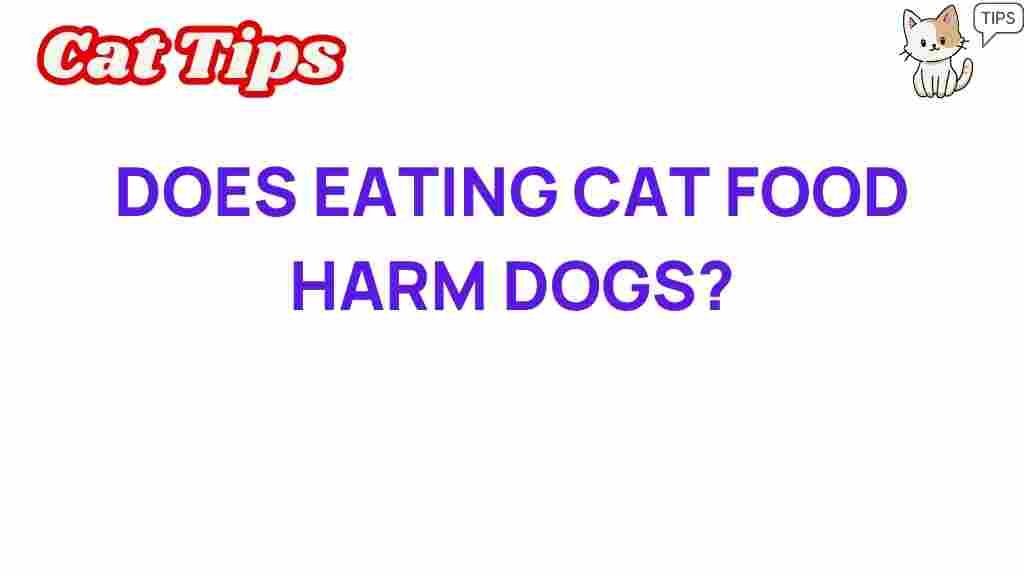The Surprising Truth: Does Eating Cat Food Harm Dogs? Understanding Dog Health
As pet owners, we often wonder what our furry friends can and cannot eat. One common question that arises is whether it’s safe for dogs to eat cat food. With the rapid rise in the popularity of pet ownership, many households have both cats and dogs. This leads to the inevitable scenario where a dog might sneak a bite of cat food. But is this harmless, or could it potentially harm your dog’s health? In this comprehensive guide, we will explore the implications of dogs eating cat food and its impact on dog health.
Why Do Dogs Eat Cat Food?
Dogs are naturally curious animals, and their inquisitive nature often leads them to explore the food bowls of their feline friends. There are several reasons why dogs might be drawn to cat food:
- Smell: Cat food generally has a stronger aroma than dog food, making it more appealing to dogs.
- Fat Content: Cat food is higher in fats and proteins, attracting dogs who are instinctively drawn to richer foods.
- Curiosity: Dogs are known to investigate everything around them, including their housemates’ food.
Is Cat Food Safe for Dogs?
While the occasional nibble of cat food is unlikely to cause significant harm to most dogs, it is essential to understand the potential risks associated with feeding cat food to dogs regularly. Here’s what you need to know about how eating cat food affects dog health:
1. Nutritional Differences
One of the primary concerns regarding dogs eating cat food lies in the nutritional composition of the two types of food. Here are some key differences:
- Protein Levels: Cat food typically contains higher protein levels than dog food. While dogs require protein, excess amounts can strain their kidneys over time.
- Taurine: Cats need taurine, an amino acid that dogs can synthesize on their own. While it’s not harmful, excessive consumption from cat food can be unnecessary for dogs.
- Fat Content: The higher fat content in cat food can lead to obesity and pancreatitis in dogs if consumed regularly.
- Vitamins and Minerals: Cat food is fortified with nutrients that may not be suitable for dogs, such as certain vitamins in excessive amounts.
2. Short-Term Effects of Eating Cat Food
Occasionally eating cat food is unlikely to harm your dog, but short-term effects can occur:
- Upset Stomach: A dog may experience gastrointestinal upset, resulting in diarrhea or vomiting.
- Increased Thirst: The high protein and fat content can lead to increased thirst in dogs.
3. Long-Term Health Risks
Regular consumption of cat food can lead to severe health issues in dogs:
- Obesity: The extra calories from cat food can lead to weight gain.
- Pancreatitis: Inflammation of the pancreas can occur due to high-fat diets.
- Kidney Damage: Over time, the excess protein can stress your dog’s kidneys, leading to health complications.
Step-by-Step Process: What to Do if Your Dog Eats Cat Food
If you find that your dog has eaten cat food, here’s a step-by-step guide to ensure your dog’s health remains uncompromised:
- Monitor Symptoms: Watch for any signs of gastrointestinal distress, such as vomiting or diarrhea.
- Provide Fresh Water: Ensure your dog has access to fresh water to prevent dehydration.
- Consult Your Vet: If your dog shows any concerning symptoms, contact your veterinarian for advice.
- Prevent Access: Take measures to ensure your dog cannot access the cat’s food in the future.
Troubleshooting Tips for Pet Owners
To maintain optimal dog health and prevent issues related to eating cat food, follow these troubleshooting tips:
- Separate Feeding Areas: Feed your dog and cat in different locations to minimize the chance of cross-contamination.
- Use Raised Feeders: Consider using raised food bowls for your cat to make it harder for your dog to reach.
- Monitor Feeding Times: Supervise feeding times to ensure your dog does not sneak in for a snack.
- Consult with a Vet: If you’re unsure about your dog’s diet, consult your veterinarian for tailored advice.
Conclusion: Prioritizing Dog Health
In conclusion, while an occasional taste of cat food is unlikely to harm your dog, it’s essential to understand the potential risks associated with regular consumption. The nutritional differences between cat food and dog food can lead to various health issues that can be detrimental to your dog’s well-being. Always prioritize your dog’s health by providing a balanced diet formulated specifically for their nutritional needs.
If you’re concerned about your dog’s eating habits or diet, consider consulting a veterinarian for personalized advice. For more information on pet nutrition and health, check out this resource.
Ultimately, keeping your dog healthy and happy is the most important aspect of pet ownership. By taking preventative measures and understanding the implications of your dog’s eating habits, you can ensure a long, healthy life for your furry friend.
This article is in the category Health and created by CatTips Team
